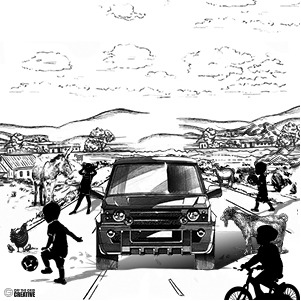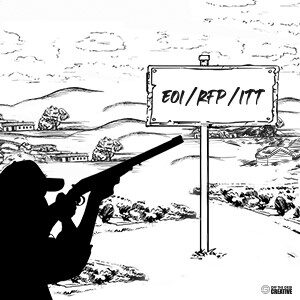 It was 2am, the third late night in a row, but the RFP was packaged and ready to be delivered. I drove home for a two hour sleep before getting to the airport for an early international flight. Boarded the small twin prop 20-seater plane. We taxied out onto the main runway and the plane leapt forward and gained speed quickly only to come to a grinding halt. The plane then turned off the main runway and weaved its way back to the apron stand. The tower had noticed the cargo door was not closed, imagine being mid-air when the door opened! The plane had to be re-fuelled and we started out again.
It was 2am, the third late night in a row, but the RFP was packaged and ready to be delivered. I drove home for a two hour sleep before getting to the airport for an early international flight. Boarded the small twin prop 20-seater plane. We taxied out onto the main runway and the plane leapt forward and gained speed quickly only to come to a grinding halt. The plane then turned off the main runway and weaved its way back to the apron stand. The tower had noticed the cargo door was not closed, imagine being mid-air when the door opened! The plane had to be re-fuelled and we started out again.
The clock was ticking. We eventually landed and I had to navigate airport security who wanted to check the contents of my package. After some challenging discussions, I managed to convince them not to open it. The office manager was frantically waiting for me. We drove at breakneck speed along rural roads narrowly missing children, donkeys, goats, and chickens. We finally arrived only to find the venue for accepting the submission had been moved to another building further down the road. We made it with 2 minutes to spare.
We all have ‘war’ stories to tell but is this one to be proud of? At the time I had thought so, only because the culture of the organization I worked for applauded those who burnt the midnight oil.
A couple of months later and a different continent. I had been invited to speak at the APMP National Capital Area (Washington) Chapters conference. One of the keynote speakers posed the question “Raise your hands those of you who have worked late into the night on a bid recently.” There was a flurry of hands being raised and many thought we were going to be praised. However, the speaker made the point that it is not something we should feel proud of. It is definitely not a badge of honor and we should not advocate it in our own organizations.
I had a seventeen-hour flight home to reflect on what I could do to change the culture in my organization.
 I spent time analyzing the bidding activity over the previous two years to determine any trends in the data. The single biggest issue was the lack of pre-positioning and knowledge around each opportunity. Each sector of the business was bidding against anything that had EOI/RFP/ITT written on it. It was like hunting season! In fact, we had submitted over 45 EOIs to a single client in a ‘targeted’ drive and never got shortlisted once in a six-month period. Upon further investigation, we had attended only one introductory meeting. Not sufficient to make an impression or to understand the client and their aspirations. An unfortunate oversight.
I spent time analyzing the bidding activity over the previous two years to determine any trends in the data. The single biggest issue was the lack of pre-positioning and knowledge around each opportunity. Each sector of the business was bidding against anything that had EOI/RFP/ITT written on it. It was like hunting season! In fact, we had submitted over 45 EOIs to a single client in a ‘targeted’ drive and never got shortlisted once in a six-month period. Upon further investigation, we had attended only one introductory meeting. Not sufficient to make an impression or to understand the client and their aspirations. An unfortunate oversight.
I produced a presentation to management with my findings and a proposed way forward. It involved a lot more focus on client engagement, pre-positioning, capture planning, following the proposal management process and a change in the ‘super hero’ culture.
I managed to get buy-in based on the facts I had presented and the strategy I was proposing. Even with the senior management buy-in it took time. The fear of not bidding for a project was palpable and I had to challenge each opportunity.
The way forward was to:
- review the client list and determine the key clients with whom we wished to work
- develop stronger relationships with these clients
- identify key opportunities aligned to our capabilities
- qualify the opportunities
- create capture/opportunity plans
- qualify the ITT when it lands
- review and improve the proposal management process
- efficient use of the right resources
- continuously apply lessons learned
We did manage to get back to winning ways through focused bidding. By following the process, we seldomly worked late nights. This was both a win for the proposal and sales team. We reduced our bidding activity from 389 bids in the first six months to 86 in the following six months with an increase in the Win rate. We had five key, ‘must win’ bids, of which we won four.
We will all face the above scenario in most of our organisations and it is about gaining confidence through APMP certification, networking and attending webinars and conferences that you will be able to challenge the status quo. The reward for this is when we get acknowledged for our professionalism, our knowledge and the value that we ourselves add to the proposals we produce. Then we can be professional ‘super heroes’.



Join the Conversation